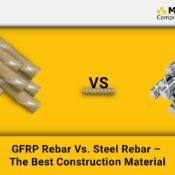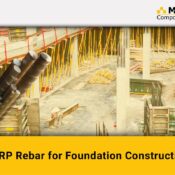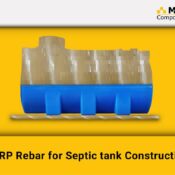GFRP Rebar vs. Steel Rebar: Strength, Durability & Benefits
What Is GFRP Rebar?
GFRP (Glass Fiber Reinforced Polymer) Rebar is a high tensile material used for construction. It is an alternative to steel reinforcement rebar. It is the strongest, cheapest and one of the best building materials for the construction project.
GFRP reinforcing bar has higher tensile strength and corrosion resistance than steel rebar. In addition, GFRP Rebar has been confirmed to be the solution as a significant development in strengthened concrete technology.
What Are The Differences Between Gfrp Rebar Vs Steel Rebar?
- Stronger:- GFRP Rebar is two times stronger than the steel rebars. For concrete structures, it is required that the structure can handle the construction stress.
- Lighter:- The glass fibre reinforced polymer Rebar is ¼ lighter than the steel rebar. The density of the components of GFRP does not exceed 1.9 tons per 1 cubic meter, which is 1/4 less than the density of steel reinforcement bars. The GFRP Rebar is extremely lightweight as compared to Steel rebars.
- Cost-Effective:- The GFRP Rebar cost is low compared to steel rebar price and provides the best quality for construction. At the same, the cost of steel rebar is high and provides low quality. Cost and quality always matters for the construction business and all the other businesses.
- Handle High-Temperature Stress:- The GFRP Rebar is capable enough to handle high-temperature stress. In places like tunnels, Nuclear stations, Power Stations, Highways, etc., where the temperature is always high, we can use this rebar. Steel rebar cannot handle high-temperature stress. Steel rebar melts at low temperatures.
- Water-Compatible:- GFRP Rebar is corrosion-resistant to water, so in places like dams, waterside walls, and docks, you can use this rebar. With the use of this rebar, you can reduce construction and maintenance costs. However, steel’s vulnerability to corrosion cost governments and asset owners billions of dollars in maintenance costs to repair or replace aging infrastructure.
- Easy transportation:- The transportation of the GFRP Rebar is effortless as compared to the steel rebar. You can bend the GFRP Rebar, so it is easy to load this rebar on the vehicle. You can not bend the steel rebar, so the transportation of steel rebar is difficult.
Composition Of GFRP Rebar vs Steel Reinforcement bars
GFRP Rebar, also called (Glass Fiber Reinforcing Polymer) is composed of a polymer plastic matrix with embedded glass fibres. The polymer is made of a vinyl ester, epoxy or polyester thermosetting plastic. The steel rebar is composed of iron with a small percentage of carbon.
The difference between GFRP Rebar and steel rebar is that GFRP Rebar is more durable, cost-effective, more robust and lighter.
Durability Performance Of Gfrp Rebar Vs Steel Rebar
The durability depends on the outer layer of rebar. Over time, carbon dioxide and chlorides in the air or water enter the pores of the concrete and reduce the alkalinity or pH level of the hardened concrete.
GFRP’s corrosion resistance eliminates carbon and chloride-induced corrosion and protects the construction. As a result, the construction cost and maintenance cost is very low as compared to steel rebar.
MRG Composite Rebar
MRG Composites Rebar is the leading GFRP rebar manufacturer in India, offering high-quality and durable solutions for construction projects. As The Pioneers of GFRP rebars in India, MRG Composites sets the benchmark for innovation and reliability. With the best GFRP rebar prices in India, we ensure quality and reliability. Contact us for expert consultation and superior reinforcement solutions. GFRP Rebar is an ideal choice for all construction.
Conclusion
GFRP Rebar is better than the steel rebar. GFRP Rebar is a more robust, lighter, and cost-effective material than steel rebar. The construction of GFRP rebar has more benefits than the steel rebar for the construction project.
Gfrp Rebar Vs. Steel Rebar FAQs
- How are MRG GFRP Rebars better than metal rebars? What are the advantages of composite reinforcement in comparison with metal reinforcement?
1. Strength: composite reinforcement has strength characteristics which are 2-3 times superior to steel reinforcement.
2. Durability: the coefficient of temperature expansion of composite reinforcement is close to the coefficient of thermal expansion of concrete, so that in concrete structures there are no associated micro defamations, microcracks and the overall durability of the structure is substantially increased.
3. Corrosion resistance: As we know that steel rebars are prone to corrosion and have a life of 20-25 years whereas GFRP Rebars are 100% anti corrosive in nature and have a life of over 80 years making it much more durable.
4. Chemical resistance - composite reinforcement has great chemical resistance in various aggressive environments, it is not susceptible to corrosion which also positively affects the durability.
5. Lightweight: composite reinforcement with comparable strength characteristics is lighter than steel reinforcement by almost 4 times.
6. Low thermal conductivity: due to low thermal conductivity, "temperature bridges" are not formed on the structures, which reduces the thennal loss to 34% and accordingly the conditioning cost of the building.
7. Easy installation: composite rebars can be cut from the bay of any given length which increases speed of work at site, later fastened with plastic clips, special fasteners/clamps or just with traditional binding wires.Easy transportation and storage: you can fold the composite rebars into coils at the time of production, which allows us to use even cars, autos, scooters for transportation and save on transport cost significantly.
As we know that GFRP rebars have a density of only 1.9 Tons/m³ making it almost 4 times lighter than metal rebars. This helps in loading 4 time more material into trucks than steel and can save a significant amount on logistics costs.
8.. Custom length: unlike metal reinforcement, composite Rebars can be provided in custom lengths which can help in reducing costs as no overlapping is required and time, labor cost is saved. - Can you bend/curve GFRP Rebars on site?
No, as the mechanical properties of GFRP Rebars are elastic, thus it does not allow you to bend the material on site. However, you can get your desired bend/curved elements prefabricated as per your requirement.
All Categories
Recent Posts
GFRP Rebar vs. Steel Rebar: Strength, Durability & Benefits
GFRP Rebar for Foundation Construction
GFRP Rebar for Septic tank Construction
MON-SAT 8:00-9:00
+91 69 863 6420




